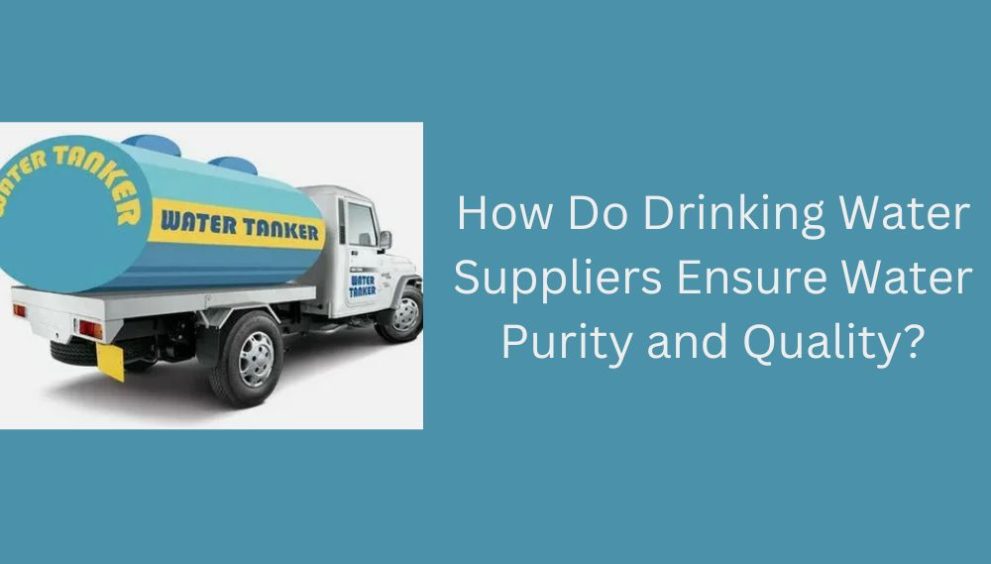How Do Drinking Water Suppliers Ensure Water Purity and Quality?

When it comes to drinking water, quality and purity are of the utmost importance. After all, we rely on water not just for hydration but for our overall health and well-being. Whether it’s the water you drink at home, in your office, or in your community, you want to be sure that it’s clean, safe, and of the highest quality. This is where drinking water suppliers come into play. But how do they ensure that the water they provide meets these standards? In this blog, we will explore the various steps and measures drinking water suppliers take to ensure water purity and quality.
NOTE: Looking for trusted drinking water suppliers in Abu Dhabi? Contact us today for high-quality, purified water delivered right to your doorstep. Ensure the health and safety of your family or business with our reliable water supply services
Understanding Water Purity and Quality
Before we dive into the methods that water suppliers use to ensure water quality, it’s important to first understand what “water purity” and “water quality” mean.
What is Water Purity?
Water purity refers to the absence of contaminants or harmful substances in the water. Pure water is free from pollutants such as bacteria, viruses, heavy metals, chemicals, and other toxins. The purer the water, the fewer harmful elements it contains, making it safer to drink and use for various purposes.
What is Water Quality?
Water quality, on the other hand, is a broader concept. It not only includes the purity of the water but also the physical, chemical, and biological characteristics of the water. These characteristics include things like the taste, odor, clarity, pH level, and the presence of minerals and nutrients that can affect the taste and overall safety of the water.
Why Are Water Purity and Quality Important?
Drinking pure and high-quality water is essential to maintaining good health. Contaminated or low-quality water can cause a variety of health issues, including waterborne diseases, digestive problems, and even long-term chronic illnesses.
For these reasons, it’s crucial to ensure that drinking water suppliers take every necessary step to deliver clean, pure, and high-quality water to their customers.
How Do Drinking Water Suppliers Ensure Water Purity?
There are several ways that drinking water suppliers ensure the water they provide is pure. Let’s look at some of the most common and effective methods.
1. Water Filtration Systems
One of the most important tools that drinking water suppliers use to ensure purity is water filtration. Filtration systems are designed to remove harmful substances from water, including sediments, chlorine, bacteria, and heavy metals. There are different types of filtration systems, each designed to target specific contaminants.
Types of Filtration Systems Used by Suppliers:
- Reverse Osmosis (RO) Filtration: RO filtration uses a semipermeable membrane to remove impurities. Water is forced through the membrane, which filters out contaminants like chlorine, heavy metals, and bacteria.
- Activated Carbon Filtration: This method uses activated carbon to absorb and remove chlorine, volatile organic compounds (VOCs), and other chemicals that can affect the taste and odor of water.
- UV Purification: Ultraviolet (UV) light is used to kill bacteria, viruses, and other microorganisms that may be present in the water, ensuring it is free from harmful pathogens.
2. Regular Testing and Monitoring
Drinking water suppliers routinely test and monitor the water they deliver to ensure it meets safety standards. This involves regular testing for various contaminants, including:
- Bacterial Contaminants: Testing for harmful bacteria such as E. coli and other pathogens ensures the water is safe to drink.
- Chemical Contaminants: Suppliers check for chemicals like lead, chlorine, and pesticides, which can negatively affect the purity and quality of water.
- Heavy Metals: Heavy metals like arsenic, mercury, and cadmium are harmful to health. Regular testing helps ensure these contaminants are not present in unsafe levels.
3. Water Source Quality
The source of the water plays a significant role in determining its purity. Suppliers usually source water from reputable and protected sources such as underground aquifers, rivers, or municipal systems. These sources are carefully selected to avoid contamination from pollutants or harmful substances.
Additionally, water suppliers ensure that the source water is regularly tested and treated before being delivered to customers. In many cases, water suppliers also install advanced systems to protect water sources from environmental threats, including industrial waste or sewage runoff.
How Do Drinking Water Suppliers Ensure Water Quality?
In addition to ensuring the water’s purity, drinking water suppliers also focus on maintaining high water quality. Quality water not only tastes better but is also safer and more beneficial for consumption.
1. Mineral Content Management
Water often contains natural minerals like calcium, magnesium, and potassium, which can have an impact on its taste and nutritional value. While some minerals are beneficial, others can cause hardness or affect the water’s flavor. Drinking water suppliers manage mineral content to ensure the water is balanced, flavorful, and healthy to drink.
For example, many suppliers use water softening systems to remove excess minerals like calcium and magnesium, which can make water “hard” and leave stains on fixtures and appliances.
2. Maintaining the pH Level
The pH level of water determines whether it is acidic, neutral, or alkaline. Water with a pH that is too high or too low can have an unpleasant taste and may even cause digestive issues. Drinking water suppliers monitor and adjust the pH level to ensure that the water is within the optimal range for drinking, usually around 7 (neutral).
Some suppliers may also add beneficial minerals like sodium bicarbonate to improve the pH balance and enhance the taste of the water.
3. Taste and Odor Control
Water that tastes or smells bad can be unpleasant to drink and may deter people from consuming enough water. To maintain high water quality, suppliers ensure that the water has no unpleasant odors or tastes.
For this, water suppliers often use filtration methods such as activated carbon filters, which are effective at removing chlorine, sulfur, and other substances that can cause off-putting smells or flavors. They may also use ozone treatment to freshen the water and improve its overall taste.
4. Packaging and Transportation Standards
After the water is purified and quality-tested, drinking water suppliers ensure that it remains clean and fresh during packaging and transportation. The bottles or containers used to hold the water are made of food-grade materials that do not leach harmful chemicals into the water. Suppliers also follow strict hygiene standards during the bottling process to prevent contamination.
In addition, the transportation of drinking water is carried out in clean, sanitized vehicles to ensure that the water does not come into contact with dirt or pollutants. This helps maintain the water’s quality right until it reaches the customer.
Best Practices for Drinking Water Suppliers
To ensure both purity and quality, drinking water suppliers follow best practices that comply with national and international safety standards. These practices include:
- Adherence to Local Regulations: Drinking water suppliers must follow strict local regulations and guidelines set by health authorities to ensure that the water they provide is safe and meets quality standards.
- Sustainability Efforts: Many water suppliers are committed to sustainability, ensuring that they source water responsibly and manage it efficiently. This can include efforts to reduce water waste, minimize plastic usage, and invest in eco-friendly packaging.
- Customer Education: Suppliers also educate their customers on proper water storage and handling practices to maintain the water’s purity and quality at home or at the workplace.
Conclusion
Ensuring water purity and quality is no small task. But drinking water suppliers take every possible measure to guarantee that. The water they provide is safe, clean, and of the highest standard.
From using advanced filtration systems to regularly testing and monitoring water, suppliers play a vital role in providing consumers with the best drinking water possible.
By focusing on both purity and quality, they help ensure that the water you drink is not only safe but also tastes great and is beneficial for your health.
So, next time you drink a glass of water, you can be confident that suppliers are doing their part to deliver the best water to you.
For more insightful articles related to this topic, feel free to visit bloggingshub.com













